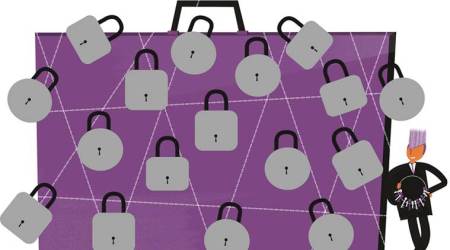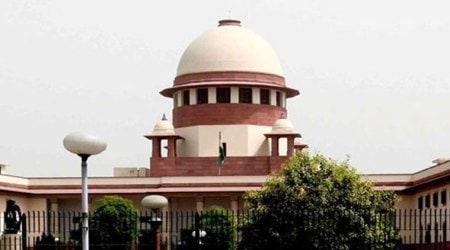 Right to privacy ruling: A nine-judge bench of the constitution bench unanimously held that right to privacy is a guaranteed fundamental right.
Right to privacy ruling: A nine-judge bench of the constitution bench unanimously held that right to privacy is a guaranteed fundamental right.
In a landmark verdict, the Supreme Court on Thursday held Right to Privacy as a fundamental right, guaranteed under Article 21 of the Constitution. “Privacy intrinsic to freedom of life and personal liberty guaranteed under Article 21 of Constitution,” the nine-judge bench unanimously observed. The bench overruled decisions in M P Sharma case and Kharak Singh case which had said right to privacy was not protected by Constitution. “The decisions stand overruled”, it said.
The verdict has significant consequences for the common man as it will empower him/her with a powerful tool to fight unlawful intrusions by the state into their personal lives. But the very fact that the court has traced it to part 3 would mean that the restrictions applicable to other fundamental rights will also apply to privacy. The judgement will also form the basis on which petitions challenging the Aadhaar Act will now proceed.
Progression of the case
The question about right to privacy was first raised before a bench which was hearing a clutch of petitions challenging the Centre’s move to make Aadhaar mandatory to benefit from social and welfare schemes. The verdict was reserved after hearing marathon arguments for six days over a period of three weeks, during which submissions were advanced in favour and against the inclusion of the right to privacy as a fundamental right.
During the six-day hearing, senior counsel Gopal Subramanium, who argued for declaring privacy a fundamental right, had said, “…privacy was embedded in the expressions liberty and dignity as appearing in the Preamble to the Constitution. Liberty is inalienable… all choices are a part of the exercise of liberty… humans cannot exist without liberty… liberty is heart and soul of the Constitution.”
Senior counsel Soli Sorabjee, who also argued for declaring privacy a fundamental right, had said, “Non-mentioning of privacy rights explicitly in the fundamental rights does not signify it does not exist. It can be deduced from other fundamental rights mentioned in Part III of the Constitution. Freedom of press too was not mentioned but deduced so.”
The Centre, which argued against privacy being a “wholly qualified” fundamental right, had said it would be subject to reasonable restrictions, just like other fundamental rights. Attorney General K K Venugopal had said, “Since the right to privacy consists of diverse aspects and is a sub-species of the right to liberty, every aspect of sub-species will not qualify as a fundamental right”. Venugopal said privacy, as a right, could not be seen in isolation, and was, in fact, a “conglomerate of rights” which had to be treated on a case-to-case basis.
Meaning of the verdict on Aadhaar
While this verdict settles the issue that privacy is indeed a fundamental right as read into the Constitution, the issue of Aadhaar being made compulsory for various schemes is yet to be examined and decided by the Court.
The verdict urges the government to consider and create a “robust regime for data protection. The creation of such a regime requires a careful and sensitive balance between individual interests and legitimate concerns of the state.” Even when the Supreme Court judgment talks about keeping digital privacy intact, it is also taking into consideration the ideas of “protecting national security, preventing and investigating crime, encouraging innovation and the spread of knowledge, and preventing the dissipation of social welfare benefits.”
 “Informational privacy is a facet of the right to privacy,” the SC judgement reads.
“Informational privacy is a facet of the right to privacy,” the SC judgement reads.
Privacy and sexual orientation
The judgement also ushered in hope for the LGBTQ community as the apex court concluded that privacy includes the preservation of personal intimacies at its core and that sexual orientation is an essential attribute of privacy. The court held that privacy and protection of sexual orientation lie at the core of the fundamental rights under Articles 14, 15 and 21 of the Constitution.
“The purpose of elevating certain rights to the stature of guaranteed fundamental rights is to insulate their exercise from the disdain of majorities, whether legislative or popular. The guarantee of constitutional rights does not depend upon their exercise being favourably regarded by majoritarian opinion,” the court held, adding that “the Koushal rationale that prosecution of a few is not an index of violation is flawed and cannot be accepted.”
 The court concluded that privacy includes the preservation of personal intimacies at its core and that sexual orientation is an essential attribute of privacy. (File – Express photo by Partha Paul)
The court concluded that privacy includes the preservation of personal intimacies at its core and that sexual orientation is an essential attribute of privacy. (File – Express photo by Partha Paul)
The Supreme Court further held that “discrimination against an individual on the basis of sexual orientation is deeply offensive to the dignity and self-worth of the individual. Equality demands that the sexual orientation of each individual in society must be protected on an even platform. The right to privacy and the protection of sexual orientation lie at the core of the fundamental rights guaranteed by Articles 14, 15 and 21 of the Constitution.”
Opposition hails the judgement
The verdict was hailed as a historic and positive one by many leaders. CPI(M)’s Sitaram Yechury tweeted, “Congratulations to all lawyers, activists, others who fought this govt’s sinister designs to deny Indians their fundamental right to privacy. A far-reaching judgement which will have consequences in various domains, as technology is playing a greater role in our day-to-day lives. We have been opposed to mandatory Aadhaar, data misuse by foreign tech corporates. This judgement will pave the way for securing our rights.”
Congress president Sonia Gandhi on Thursday said the judgment strikes at “unbridled encroachment and surveillance” by the State and its agencies on the life of the common man. She added that Congress and other opposition parties have together spoken for the right to privacy against “arrogant” attempts of BJP govt to curtail them.
Congress vice-president Rahul Gandhi echoed similar views. He welcomed the verdict, and said that it was a major blow to “fascist forces” and a rejection of the BJP’s ideology of “suppression through surveillance”. The judgment was a “victory for every Indian”, Gandhi said on Twitter.
Delhi CM Arvind Kejriwal and former UP Chief Minister Akhilesh Yadav thanked the Supreme Court for its ruling.
Former Finance Minister P Chidambaram also welcomed the verdict. “Privacy is a fundamental right. The freedom that was won in 1947 has been enriched and enlarged. Privacy is the core of personal liberty. Article 21 has acquired a new magnificence,” he tweeted.
Centre says ‘Crux of Supreme Court judgment wider affirmation of govt view’
Law Minister Ravi Shankar Prasad welcomed the judgement on behalf of the Centreand said the “essence of the judgment is a wider affirmation of the crux of the observation made by the finance minister while moving the Aadhaar act in the house”.
“On behalf of the government of India, Attorney General has also argued that right to privacy is a part of fundamental rights, with reasonable restrictions,” Prasad said. He added that it is “unknown in civilised existence that a government was seeking to collect data of its countrymen without the authority of law”.
Finance Minister Arun Jailtey blamed the UPA government for the Aadhaar issue going to court. “Privacy issue went to Supreme Court because previous UPA government brought Aadhaar without legal framework,” he said. “Privacy issue went to Supreme Court because previous UPA government brought Aadhaar without legal framework,” he added.
He called the verdict a positive development. “SC accepted privacy is a fundamental right but not an absolute right; judgement is a positive development.”

